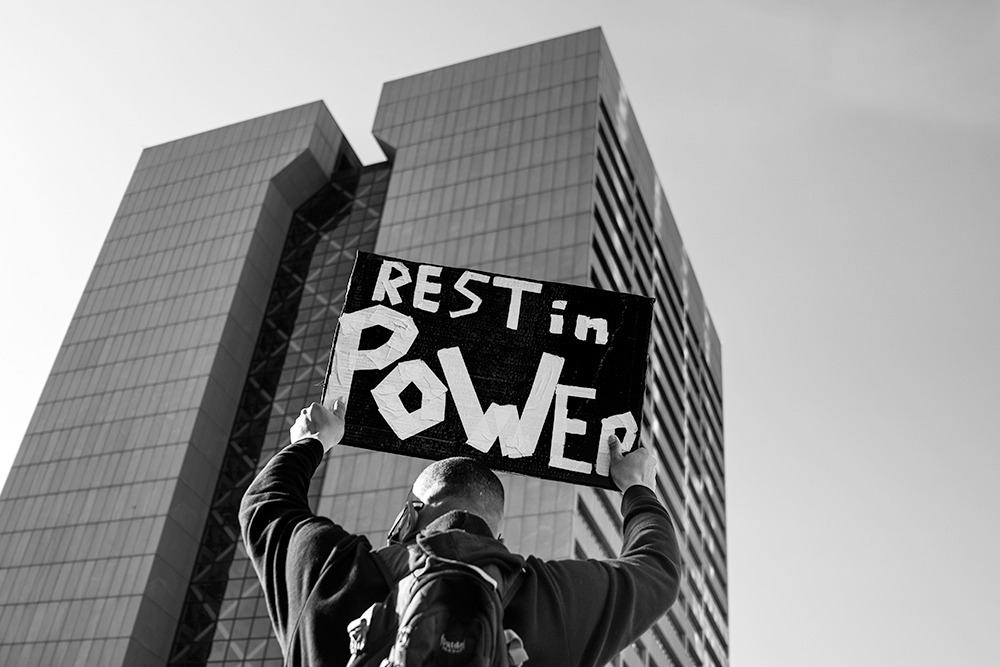
It’s not easy to be rational at a time of loss and grief. No-one expects us to make much sense when we’re dealing with death close at hand. So the way we think about dying and death sometimes lags behind the way we think about everything else; old ways, old habits of thought and language, hang on where they otherwise might have been swept away. "Rest in peace", we say (or tweet, or hashtag on Insta, or type under sad Facebook posts). What do we mean? What do we think we mean?
Obviously we have in mind some sort of quiet repose, an eternal nap. It’s an invitation to the dead (or an instruction: relax, for god’s sake), to take it easy, kick back, enjoy – enjoy whatever it is that’s going on, where they are. The wet silence of the subsoil. The fresh-laundered library quiet of heaven. Or oblivion – a possibility that raises some questions.
Can there be a happy oblivion? I’m not sure oblivion can be said to have any qualities at all. "To die, to sleep, no more," says Hamlet, "tis a consummation devoutly to be wished". What springs to my mind if I picture myself resting in peace is a sort of pleasant, warm, half-awake doze, perhaps with the cricket on the radio, and the cat asleep on my feet – is this what eternity is meant to look like?
Perhaps "rest in peace" is best understood from a darker perspective – starting from the premise that all life is struggle and heartbreak, it’s only a small step to the conclusion that even oblivion has to be better than this. Some gentleness, finally, for the tormented – a safe space with the lights turned down and the outside world set to mute. "Peace At Last", reads Lenny Bruce’s epitaph (it kind of recalls Swift’s: "Savage indignation," in Yeats’ translation, "cannot lacerate his breast").
Those of us who think of death as a full-stop, an absolute ending, still find ourselves reaching for "RIP" when someone we care about – whether we knew them or not – passes away (and there I go again: passes away to where? Of course I mean dies). We just don’t know what else to say. Sometimes we say "go well", which sounds a bit sort of solemnly Viking-ish but leaves us in the same sticky spot, philosophically.
The troubled American twenty-first century brought us a fresher, fightier take on "RIP", as the death of the US graffiti artist "Dream" Francisco prompted the first known use of "Rest In Power" – an intimation that the values of a person live on after them, that their fight goes on, that their strength can still give strength to others, and that even in death they can still shape the world. The term grew in popularity as an activist elegy through the deaths of Trayvon Martin, Michael Brown, George Floyd and the rise of the Black Lives Matter movement – only to be co-opted, as Rochelle Hampton wrote in Slate, by the mainstream: "It can now mean everything, and so ultimately might mean nothing."
There’s a traditional Jewish benediction that I’m fond of: "May their memory be a blessing." Again, it’s about the capacity of a person to reach beyond the span of their physical life – to change the world without being in it. We are often uncomfortably balanced, in times of loss, between two desires: to mourn a death, and to celebrate a life (the European practice of clapping at sports events in memory of the departed co-exists uneasily, here, with the traditional minute’s silence). If we say "may their memory be a blessing", we express, I think, a little of each: the joy they brought us will stay with us, but there is, in the phrase, an absence, an implicit acknowledgement that they are, even so, only a memory, now.
On Twitter, "RIP" is ubiquitous. It’s a useful and universal shorthand. But the English writer Eamonn Griffin has a different approach.
On October 27, 2013, Griffin marked the death of Lou Reed with a tweet: "Lou Reed, ladies and gentlemen." It soon became habitual – a brief, simple, but warm and engaging way of saying goodbye. Writers, musicians, sportspeople, cult figures in movies or TV – anyone, really, whose death touches him some way. Tzvetan Todorov, Carrie Fisher, Ronnie Corbett, Beverly "Guitar" Watkins – dozens, hundreds, over the years. It’s a personal curation, Griffin says, when we speak.
It’s a not-much gesture to a few thousand followers, but I find it weirdly affecting. I want to know how he hears it, in his head, when he tweets it out. I picture an old-school variety compére, in sideburns and a shiny suit.
"There’s definitely an element of that," he says, "of a compére, arm outstretched as the person leaves the stage, segueing from one performer to the next. Not with the brash ebullience of a circus ringmaster, but something more low-key. Not quite working men’s club stoicism either, but definitely understated. Like a late-night DJ switching from one song to the next. So there’s something about that person having done their bit – but not to worry because there’s more to come too."
There’s no wrong way, of course, to say goodbye, to make commemoration. But this works for me. It’s about what they were, what they did, and what they meant to us, these people we’ve lost – wherever they might be now. More than that, though, it says: mourn how you want. Clap or sit silently. Grieve or don’t grieve. This was them, this person, a one-off, a life lived to completion – thank you, and goodnight.

